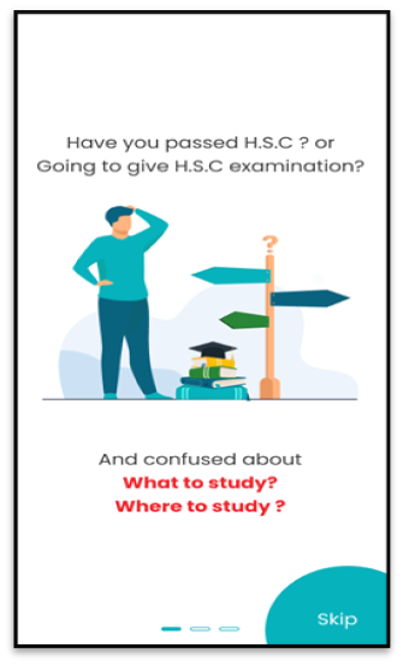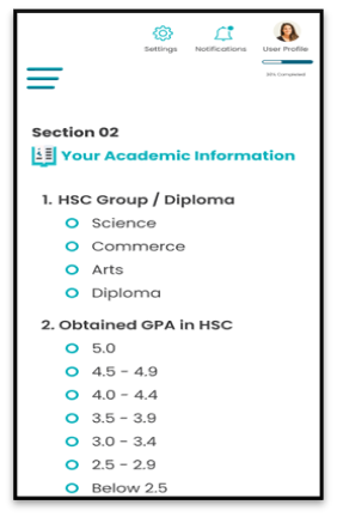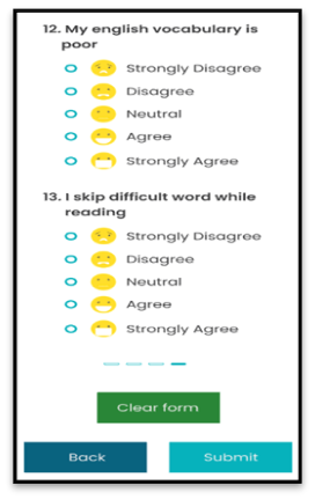What's Next
Analytics-Based Intelligent Academic Advisory System For HSC Passed Students


What’s Next (analytics-based intelligent academic advisory system) aims to guide HSC passed students in the decision-making process to determine the best possible higher study options apart from the conventional ones. This advisory system will enable students to find academic faculties that fit their interests and psychological dynamics after HSC. It is also intended to assist students in achieving their career aspirations based on their aptitude and fields of interest so that students will be able to make the best out of their potential which will foster development in the country and their own lives.
Video
Specifications
- Tailors educational experiences to individual interests and personalities.
- Enhances student engagement and motivation by matching majors to passions and strengths.
- Alleviates stress of choosing a major through informed recommendations.
- Leads to more fulfilling and successful academic and career outcomes.
- Unlocks human potential by fostering a more engaging and motivating educational journey.
Interface

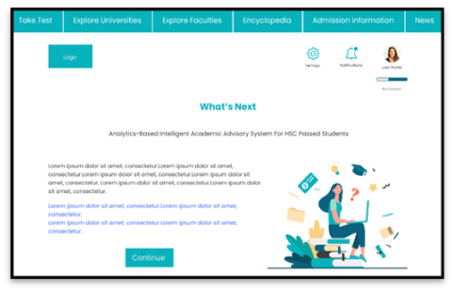
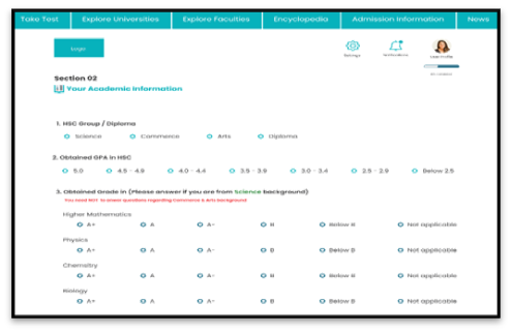
Diagrams
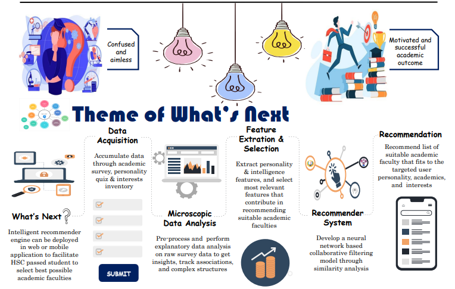
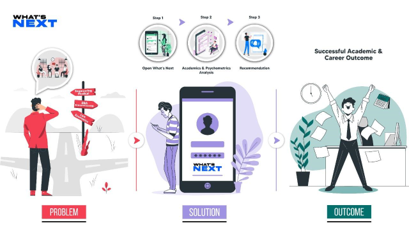
Publications
N. Kamal, F. Sarker, M. S. H. Mukta and K. A.Mamun, "Predictive Analysis of the Effects of Personality Traits on an Academic Program," 2020 2nd International Conference on Advanced Information and Communication Technology (ICAICT), Dhaka, Bangladesh, 2020, pp. 168-172, doi: 10.1109/ICAICT51780.2020.9333455. Published in: 2020 2nd International Conference on Advanced Information and Communication Technology (ICAICT) Date of Conference: 28-29 November 2020 Date Added to IEEE Xplore: 01 February 2021 DOI: 10.1109/ICAICT51780.2020.9333455 Publisher: IEEE Conference Location: Dhaka, Bangladesh
Abstract
The choice of academic program is a crucial selection as this decision plays a major role in enhancing opportunities in career path. Young adolescents often experience indecisions while choosing their academic major, which may lead to uncertainty in future. Therefore, to assist students to find the right field of study, several researches related to personality dynamics have been conducted in recent years to determine correlation between academic fields and personalities of students and the result showed evident association. Consequently, this increases the productivity and success rate in comparison. This study determines the differences amongst the students of three popular academic programs in Bangladesh and envisage the appropriate academic choice for the prospective students by analyzing their personality traits. For this study, we have collected data from a total of 135 participants. We used students’ Big5 Personality Factors (Extraversion, Openness, Agreeableness, Emotional Stability, and Conscientiousness), and academic information to develop the prediction model. Using Gaussian Classifier along with 10-fold cross-validation method, we have achieved an accuracy of 91.1%. The findings of this study demonstrate that the proposed framework has a great potential in assisting prospective students to make an informed decision to determine the suitable higher study options while increasing academic motivation ratio.
N. Kamal, F. Sarker and K. A. Mamun, "A Comparative Study of Machine Learning Approaches for Recommending University Faculty," 2020 2nd International Conference on Sustainable Technologies for Industry 4.0 (STI), Dhaka, Bangladesh, 2020, pp. 1-6, doi: 10.1109/STI50764.2020.9350461. Published in: 2020 2nd International Conference on Sustainable Technologies for Industry 4.0 (STI) Date of Conference: 19-20 December 2020 Date Added to IEEE Xplore: 16 February 2021 DOI: 10.1109/STI50764.2020.9350461 Publisher: IEEE Conference Location: Dhaka, Bangladesh
Abstract
Academic program selection is a vital decision as it plays a substantial role in enhancing opportunities in career paths. Numerous researches utilizing psychometrics have been conducted in recent years, and result reveals an evident association between academic fields and personality traits of students. To assist students in making an informed academic decision, this study analyzes the differences amongst the students of nine study programs in Bangladesh and envisages the appropriate academic choice among these nine fields for the prospective students by analyzing their academic grades, personality traits, and intelligence. For the experiment, we have collected data from 103 participants and used students’ academic grades, Big-5 personality traits, and Factor B (Reasoning) of 16PF to develop classification models by utilizing two classification approaches. Results show that the Hierarchical classification approach using Random Forest Classifier outperformed the One-level Random Forest classifier approach by obtaining 96.1% accuracy for the 1st-level and 92.86%, 89.29%, and 94.74% respectively for 2nd-level. The findings of this study demonstrate that the proposed framework has great potential in assisting prospective students to make an informed decision to determine the suitable higher study options while unlocking human potential.
Partners







